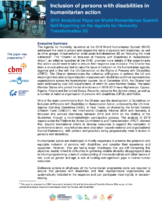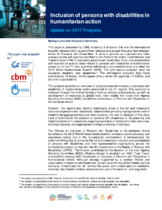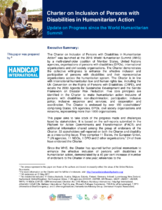This site is inactive as of February 2020. For updated information on an initiative's work, please refer to their own website as listed in their contact details.
Summary
The one billion persons with disabilities worldwide - of whom 80% live in the Global South - are among the most marginalized in crisis-affected communities. They are often unable to access appropriate basic assistance, including water, shelter, food, health or education and are rarely included in decision-making processes.
The Charter on Inclusion of Persons with Disabilities in Humanitarian Action aims to significantly improve living conditions of persons with disabilities during emergencies. By endorsing the Charter, the signatories commit to implement practical measures to ensure people with disabilities can fully benefit from humanitarian aid. The Charter’s goal is to render humanitarian action inclusive of persons with disabilities, by lifting barriers they are facing in accessing relief, protection and recovery support and ensuring their participation in the development, planning and implementation humanitarian programmes
Partners
The Charter on Inclusion of Persons with Disabilities in Humanitarian Action was developed by over 70 stakeholders from States, UN agencies, organisations involved in humanitarian contexts and organisations of persons with disabilities. It has currently been endorsed by more than 100 stakeholders. See the list of all partners: https://humanitariandisabilitycharter.org/
Actions to ensure the legacy of the Charter are co-funded by the Directorate-General for European Civil Protection and Humanitarian Aid Operations (ECHO) and Australian Department of Foreign Affairs and Trade (DFAT).

Goals
The signatories of the Charter promise that their future humanitarian actions will be inclusive of people with disabilities, based on five principles:
-
non-discrimination and recognition of the diversity of people with disabilities;
-
involvement of people with disabilities in developing humanitarian programs;
-
ensuring services and humanitarian assistance are equally available for and accessible to all people with disabilities;
-
implementation of inclusive global policies;
-
cooperation and coordination among humanitarian actors to improve inclusion of people with disabilities.
Resources





 summary
summary partners
partners goals
goals Stakeholder reports
Stakeholder reports resources
resources contacts
contacts